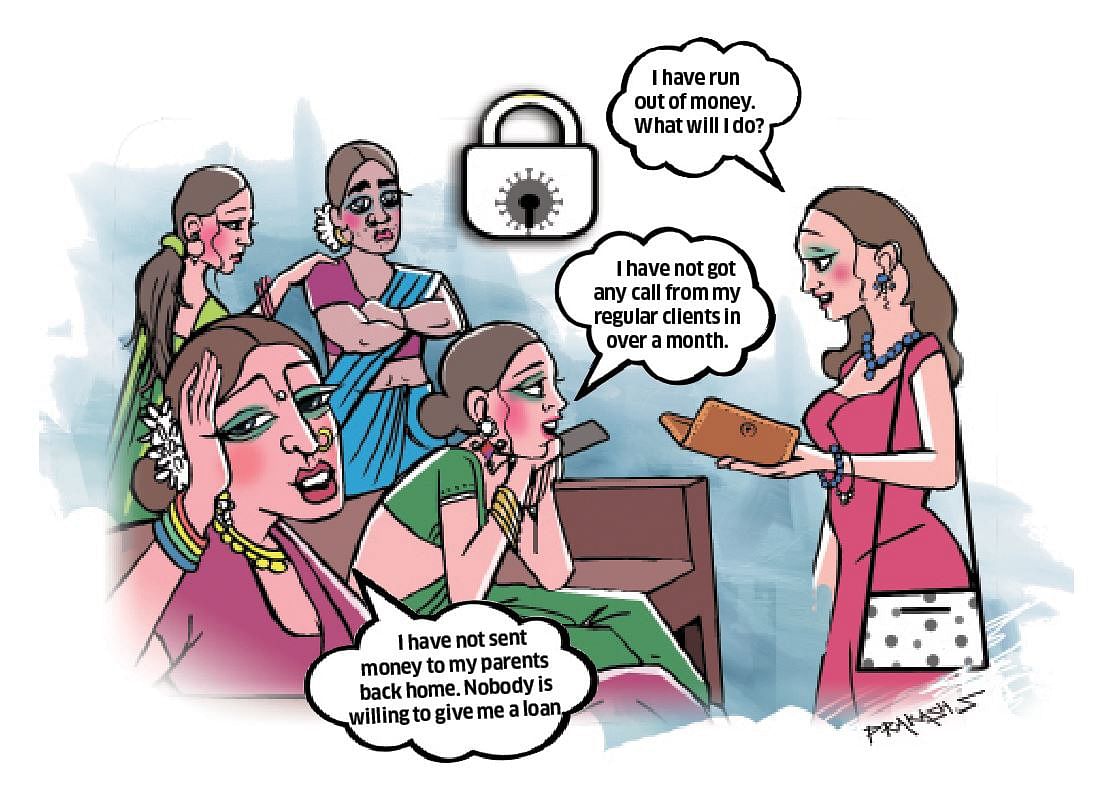
Thousands of sex workers, rendered jobless by the pandemic, are looking for alternative jobs, but stigma is coming in the way.
According to Karnataka Sex Workers’ Union, they are getting by with rations provided by NGOs, and are staring at bleak prospects.
Madhu Bhushan and Shakun Doundiyakhed, women’s rights activists associated with Gamana Mahila Samuha, say sex workers, like daily-wagers, are unable to earn a livelihood as they can’t come out on the streets.
“They know about the impact of the HIV/AIDS outbreak, and are aware of the dangers of Covid-19 too. As far as we know, no one has done any sex work in more than a month,” explains Madhu.
Some are managing with savings and support from their families. “In every crisis, like increased police or goonda violence, some start talking about other ways to earn a livelihood, but most return to sex work because their earnings are inadequate, or the stigma doesn’t leave them,” explains Shakun.
Shubha Chacko, executive director, Solidarity Foundation, says some women are part-time sex workers. “They work as domestic help, or in the garment industry or run a small enterprise,” she says.
They do sex work as income from the other sources is erratic or insufficient, or the hours don’t suit them. For example, if they have young children, they are not able to work through the day. “Now those options are also shrinking due to the lockdown,” says Shubha. Some old clients have lent them money without coming to them, but those little trickles are also drying up as everyone is struggling.
Attitude problem
Geetha M, secretary of Sadhana Mahila Sangha, says the police often harass sex workers on the pretext of cleaning up the city.
“There’s a Supreme Court ruling in 2009 that states that nobody has the right to beat up or harass sex workers. But it continues to happen,” she says. Geetha works with street sex workers and has been trying to help some of them branch out into alternative employment.
“But it is not easy. People look down on them and question their background,” says Geetha, whose organisation is providing rations to sex workers.
Sex workers grapple with psychological problems. With little social and familial support, they have to fend for themselves. “Their husbands have deserted them, families disowned them. Their daily struggles have become worse,” she says.
One of them recently told Geetha, “With HIV at least we could use a condom and continue. What will we do now? We cannot wear a full condom suit!”
Dark tendencies
Many who are HIV positive are finding it difficult to access medication. Sex workers need regular counselling to stay afloat, says Radha Murthy, an independent counsellor.
“Many develop suicidal tendencies because of the humiliation they face from family and society. They need to be counselled into believing that they have equal rights and are entitled to a good life. It takes several sessions for them to see reason and normalise,” says Radha.
NGO challenges
Organisations that work with sex workers face multiple challenges. Shubha says people feel they do not deserve support as they are not ‘good women’. This makes it a challenge to get support from the general public.
They are a hidden population, as they are not open about their occupation, fearing a social backlash. “So reaching out to them has to be done sensitively through community organisations and NGOs,” says Madhu.
What sex workers say
Richa Gulati, a resident of Kalasipalya, has been in the trade for over a decade. She says, “It’s been over a month since we have had clients. Food supplies are no problem but we don’t know what the future holds as nobody is willing to come to us.”
Hema Kumari, a resident of Kalyan Nagar, says, “We would easily earn at least Rs 5,000 a day but now there’s no money. We are scared to venture out and entertain strangers because of fear of catching an infection. We have families who depend on us back in our hometowns.”
NGOs helping sex workers
- Solidarity Foundation, contact Shubha 81977 71372
- Sadhana Mahila Sangha, contact 94482 43171
- Karnataka Sex Workers’ Union, contact Nisha 96208 89944